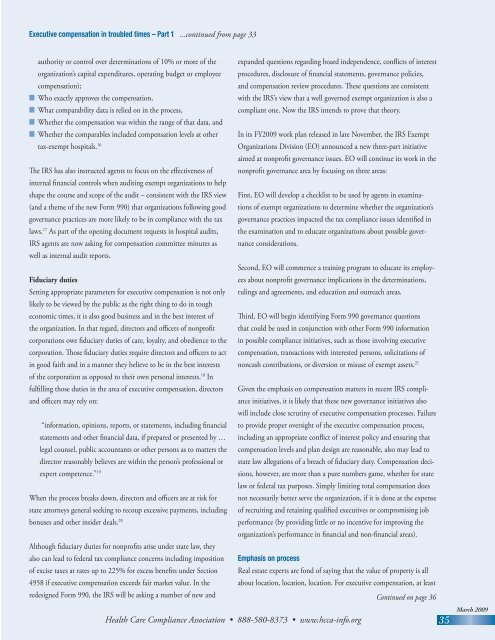BP - Health Care Compliance Association
BP - Health Care Compliance Association
BP - Health Care Compliance Association
Create successful ePaper yourself
Turn your PDF publications into a flip-book with our unique Google optimized e-Paper software.
Executive compensation in troubled times – Part 1 ...continued from page 33<br />
authority or control over determinations of 10% or more of the expanded questions regarding board independence, conflicts of interest<br />
organization’s capital expenditures, operating budget or employee procedures, disclosure of financial statements, governance policies,<br />
compensation);<br />
and compensation review procedures. These questions are consistent<br />
n Who exactly approves the compensation,<br />
with the IRS’s view that a well governed exempt organization is also a<br />
n What comparability data is relied on in the process,<br />
compliant one. Now the IRS intends to prove that theory.<br />
n Whether the compensation was within the range of that data, and<br />
n Whether the comparables included compensation levels at other In its FY2009 work plan released in late November, the IRS Exempt<br />
tax-exempt hospitals. 16<br />
Organizations Division (EO) announced a new three-part initiative<br />
aimed at nonprofit governance issues. EO will continue its work in the<br />
The IRS has also instructed agents to focus on the effectiveness of nonprofit governance area by focusing on three areas:<br />
internal financial controls when auditing exempt organizations to help<br />
shape the course and scope of the audit – consistent with the IRS view First, EO will develop a checklist to be used by agents in examinations<br />
of exempt organizations to determine whether the organization’s<br />
(and a theme of the new Form 990) that organizations following good<br />
governance practices are more likely to be in compliance with the tax governance practices impacted the tax compliance issues identified in<br />
laws. 17 As part of the opening document requests in hospital audits, the examination and to educate organizations about possible governance<br />
considerations.<br />
IRS agents are now asking for compensation committee minutes as<br />
well as internal audit reports.<br />
Second, EO will commence a training program to educate its employees<br />
about nonprofit governance implications in the determinations,<br />
Fiduciary duties<br />
Setting appropriate parameters for executive compensation is not only rulings and agreements, and education and outreach areas.<br />
likely to be viewed by the public as the right thing to do in tough<br />
economic times, it is also good business and in the best interest of Third, EO will begin identifying Form 990 governance questions<br />
the organization. In that regard, directors and officers of nonprofit that could be used in conjunction with other Form 990 information<br />
corporations owe fiduciary duties of care, loyalty, and obedience to the in possible compliance initiatives, such as those involving executive<br />
corporation. Those fiduciary duties require directors and officers to act compensation, transactions with interested persons, solicitations of<br />
in good faith and in a manner they believe to be in the best interests noncash contributions, or diversion or misuse of exempt assets. 21<br />
of the corporation as opposed to their own personal interests. 18 In<br />
fulfilling those duties in the area of executive compensation, directors Given the emphasis on compensation matters in recent IRS compliance<br />
initiatives, it is likely that these new governance initiatives also<br />
and officers may rely on:<br />
will include close scrutiny of executive compensation processes. Failure<br />
“information, opinions, reports, or statements, including financial to provide proper oversight of the executive compensation process,<br />
statements and other financial data, if prepared or presented by … including an appropriate conflict of interest policy and ensuring that<br />
legal counsel, public accountants or other persons as to matters the compensation levels and plan design are reasonable, also may lead to<br />
director reasonably believes are within the person’s professional or state law allegations of a breach of fiduciary duty. Compensation decisions,<br />
however, are more than a pure numbers game, whether for state<br />
expert competence.” 19<br />
law or federal tax purposes. Simply limiting total compensation does<br />
When the process breaks down, directors and officers are at risk for not necessarily better serve the organization, if it is done at the expense<br />
state attorneys general seeking to recoup excessive payments, including of recruiting and retaining qualified executives or compromising job<br />
bonuses and other insider deals. 20<br />
performance (by providing little or no incentive for improving the<br />
organization’s performance in financial and non-financial areas).<br />
Although fiduciary duties for nonprofits arise under state law, they<br />
also can lead to federal tax compliance concerns including imposition Emphasis on process<br />
of excise taxes at rates up to 225% for excess benefits under Section Real estate experts are fond of saying that the value of property is all<br />
4958 if executive compensation exceeds fair market value. In the about location, location, location. For executive compensation, at least<br />
redesigned Form 990, the IRS will be asking a number of new and<br />
Continued on page 36<br />
<strong>Health</strong> <strong>Care</strong> <strong>Compliance</strong> <strong>Association</strong> • 888-580-8373 • www.hcca-info.org<br />
35<br />
March 2009

















